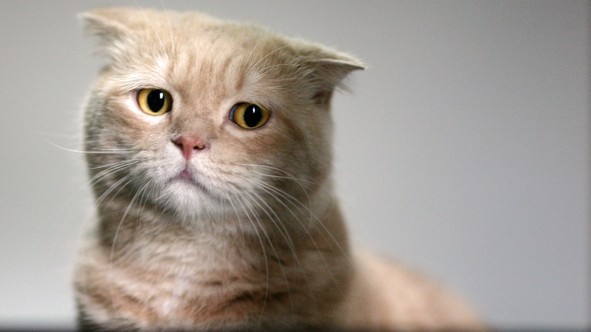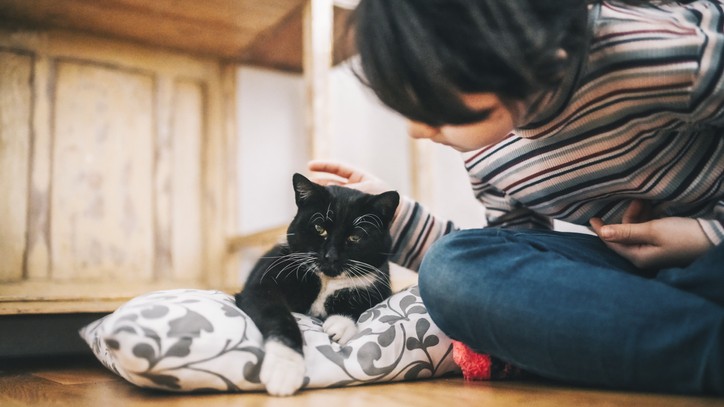Is your cat sad? A vet's guide to managing cat depression
Is your cat sad, and do you wonder if they could be depressed? Let’s take a closer look at how cats experience depression – and what to do about it

Get the best advice, tips and top tech for your beloved Pets
You are now subscribed
Your newsletter sign-up was successful
Is your cat sad? Like humans, cats can go through tough times in which they may behave differently than they normally do. Do cats feel sadness and, if so, do they experience depression the same way as humans? If your cat is eating less, sleeping more, or losing interest in their favourite cat toys – or if they just don’t seem “themselves” – keep reading to find out if your cat could be depressed and what you can do to help them.
What is cat depression?
Many cat owners will wonder whether their feline friend is depressed at some point during their lifetime. It is important to note that cats are not human and therefore do not experience human emotion. In addition, we cannot read cats’ minds to determine whether they experience sadness or depression. We can, however, observe their behavior to see if they exhibit those seen in humans diagnosed with clinical depression.
Cats can indeed show signs of depression, including an overall lack of interest in life, which suggests that they do experience issues with their mental health. Signs of depression often occur after a change in environment or family dynamic. Understanding the underlying cause of changes in a cat’s behavior can be the key to helping them, although like human depression, this may take time.
What are signs of depression in cats?
Cats may exhibit several symptoms and behaviors similar to those seen in humans with depression. These include:
- Reduced appetite, which may lead to weight loss
- Excessive sleeping
- Lack of energy
- Urinating or defecating outside the litter box
- Grooming less, resulting in matted fur
- Changes in the frequency of vocalisations
- Less interest in things they normally get excited about, like playing, mealtimes, or going outside
- Avoiding interactions with family members or becoming extra clingy
- Hiding
- Other changes in personality
Many of these symptoms can also occur with physical health problems, and cats are notoriously good at hiding signs of physical illness. For this reason, it is essential to rule out any underlying health conditions when your cat is showing signs of depression.
Causes of depression in cats
Depression often occurs following a change in a cat’s life, especially if it is significant. Some common changes include the following:
1. Moving
Moving house can be very stressful for cats in terms of both the moving process and adjusting to a new environment. Cats are most comfortable when they are within their “territory”, so a new home full of unfamiliar areas and scents can make them uneasy. Similarly, home renovations can also cause distress.
Get the best advice, tips and top tech for your beloved Pets
2. Loss of a family member
Death of a family member can cause depression in cats, regardless of whether the family member is a human or another pet. A scientific study published in Animals in 2016 found that cats showed increases in vocalizations and affectionate, territorial, and attention-seeking behaviors following the loss of another pet. Cats may react similarly to other disruptions in the family, including divorce or a child moving out. You can learn more about sign of grief in pets.
3. New family member
Like the loss of a family member, the addition of a new one (human or pet) can also substantially change the family dynamic. In addition to being curious and sometimes loud, babies, puppies, and kittens tend to take attention away from full-grown pets, resulting in increased stress levels.
4. Traumatic event
Situations that a cat deems traumatic can also lead to depression. These include accidents (i.e., getting hit by a car), extensive traveling, hospitalisation, and major surgery.

How long does cat depression last?
Luckily, depression in cats tends to be more short-lived than that seen in humans, and it often resolves with a bit of time once the root cause has been addressed. The 2016 Animals article mentioned above found that the behavioral changes observed in cats following the loss of an animal companion usually lasted for less than six months.
How is cat depression diagnosed?
If your cat is showing signs of depression, your veterinarian will want to obtain a full clinical history, perform a thorough physical examination, and possibly run some diagnostic tests. This is done to rule out any underlying health conditions that could be contributing to your cat’s symptoms.
How to help a depressed cat
Although the majority of cats with depression will improve on their own, it can be difficult for owners when they feel that their furry friend is unhappy. Some tips you can try to help your cat start feeling back to normal include:
- Sticking to a routine, as uncertainty can be a source of stress
- Providing more attention in the form of cuddles and playtimes
- Introducing new toys to keep them stimulated
- Giving more treats – this should be done in moderation, especially if your cat is already overweight
- Trying calming supplements or a feline pheromone diffuser
They say “time heals all wounds”, and like humans, depressed cats may need time to process whatever life change has triggered their decline in mental health.
When to visit your vet
If you are concerned that your cat seems sad or is showing signs of depression like decreased appetite, lethargy, or loss of interest in their favourite activities, you should schedule an appointment with your veterinarian to make sure that there are no serious physical health conditions causing these symptoms.
Dr. Diana Hasler graduated with distinction from the University of Edinburgh Royal (Dick) School of Veterinary Studies in 2018. She has experience working as a small animal veterinarian in general practice, where she has treated many dogs, cats, rabbits, and rodents. She has also recently branched out into the field of medical communications, doing freelance work as a medical editor and writer. Dr. Hasler has been Postdoctoral Research Fellow at Michigan Medicine since 2023, where she is a Laboratory Animal Medicine Resident.

